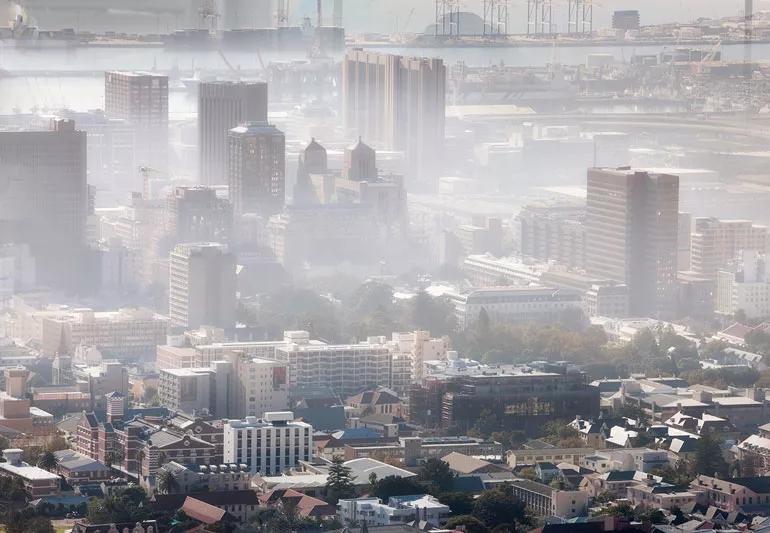Breathing in unhealthy air can harm your lungs, heart and more

When wildfire smoke colors the sky a hazy shade of orange, it’s obvious that air quality might not be at its best.
Advertisement
Cleveland Clinic is a non-profit academic medical center. Advertising on our site helps support our mission. We do not endorse non-Cleveland Clinic products or services. Policy
But there are other days when the sun is shining, the sky is blue and an “air quality alert” gets issued for your community. Is that really a watch-your-health warning you need to pay attention to?
The answer is yes, says pulmonologist Neha Solanki, MD — and here’s why.
Air isn’t just filled with … well, air. Unhealthy gasses and particulate matter float all around us. These contaminants essentially dirty the air that we breathe as we go about our day-to-day activities.
The cleanliness of our air is in a constant state of flux, too. Air quality can quickly jump from good to bad or bad to good, depending on changing conditions. (More on that in a bit.)
“When air quality is bad it can become harmful,” warns Dr. Solanki. “You’re breathing in all of these toxic materials, all of this garbage in the air, and that can have a real effect on how you feel.”
So, how do you know when the air isn’t at its best? That’s where it pays to pay attention to the U.S. Air Quality Index (AQI), a nifty scorecard kept by the U.S. Environmental Protection Agency (EPA).
More than 4,000 monitoring stations across the United States measure concentrations of five main airborne irritants. The watch list includes:
Advertisement
An air quality alert is triggered when a measured substance reaches unhealthy levels.
The AQI basically scores air quality on a scale of 0 to 500, with lower numbers being better. To put the numbers in context, the EPA categorizes them in the following six levels (arranged by value):
The rating reflects the substance measuring at the highest level at any given time, notes Dr. Solanki. So, if the ozone value is 175, the EPA rates the air quality as “unhealthy” even if other substances are at lower levels.
Many factors driving air quality come from human activity. Cars, trucks and planes that burn fossil fuels emit nitrogen oxides into the air that contribute to the smog clouding many metropolitan areas.
Industrial manufacturing facilities and power-generating plants can spew out a high volume of substances into the air, says Dr. Solanki. Even farms can pose a threat to air quality.
On a smaller scale, just using items such as gas stoves and candles add impurities to the air.
But it’s not just people. Mother Nature also contributes to air issues.
Wildfires send massive amounts of particulates into the air — and those particulates can travel thousands of miles and across continents while riding the wind. (The same is true for volcanic ash sent skyward during eruptions.)
Weather impacts air quality, too, with sunshine, temperatures and wind all playing roles.
As you probably suspect, poor air quality can make breathing-related conditions much worse. This includes conditions such as:
Poor air quality can also cause shortness of breath and coughing in people who don’t have any underlying conditions. “Your airways react to these toxins and get angry and inflamed,” explains Dr. Solanki. “It can happen to anyone.”
Advertisement
But breathing in toxins doesn’t just affect your lungs and breathing. Dirty air also has been linked to an increased risk for heart attacks, arrhythmia (irregular heartbeat) and strokes, plus just a general feeling of ickiness.
“The air you breathe in supplies, your blood, which supplies all of your organs — including your brain and your heart,” says Dr. Solanki. “If that air you breathe in is unhealthy, then your organs are getting exposed to toxic particles. It makes sense that you might feel unwell.”
If there’s an air quality alert in your area, there are ways to minimize your exposure. Dr. Solanki recommends:
Advertisement
It’s often easy to dismiss air quality warnings — especially on those sunny days when you can’t see the unhealthy air, notes Dr. Solanki.
But threats to your breathing aren’t always as obvious as a haze of wildfire smoke. Breathing in high levels of toxins can cause health problems for your lungs, heart and elsewhere in your body.
“I do think people are paying more attention to air quality given recent events — and that’s a good thing,” says Dr. Solanki.
Advertisement

Sign up for our Health Essentials emails for expert guidance on nutrition, fitness, sleep, skin care and more.
Learn more about our editorial process.
Advertisement

Breathing in toxic smoke can lead to serious health problems

Watch the weather, keep lines of communication open and make sure everyone on board has access to a personal lifejacket or flotation device

From bug bites and blisters to sunstroke and swimming safety, here’s how to stay well this season

From split lips to splinters, a little first aid can get your kiddo back on the swing set in no time

Establish rules and have a safety plan in place

As temperatures increase, so does the need for safety precautions

Prevent irritation, illness and more by using pool chemicals the right way

Make sure your wood has been split and stored for at least 6 months

Even small moments of time outdoors can help reduce stress, boost mood and restore a sense of calm

A correct prescription helps your eyes see clearly — but as natural changes occur, you may need stronger or different eyeglasses

Both are medical emergencies, but they are very distinct events with different causes